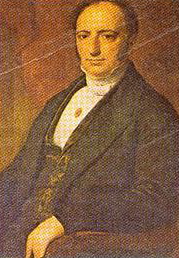Pierre-Théodore Verhaegen
| Pierre-Théodore Verhaegen | |
|---|---|
 |
|
| President of the Chamber of Representatives | |
|
In office 17 December 1857 – 19 July 1859 |
|
| Preceded by | Josse Joseph de Lehaye |
| Succeeded by | Auguste Orts |
|
In office 28 June 1848 – 3 April 1852 |
|
| Preceded by | Charles Liedts |
| Succeeded by | Noël Delfosse |
| Personal details | |
| Born |
5 September 1796 Brussels, France (now Belgium) |
| Died | 8 December 1862 (aged 48) Brussels, Belgium |
| Political party | Liberal Party |
Pierre-Théodore Verhaegen (5 September 1796 – 8 December 1862) was a Belgian lawyer and liberal politician, known as the founder of the Free University of Brussels. He was twice chairman of the Belgian Chamber of Representatives (from 28 June 1848 to 28 September 1852 and from 17 December 1857 to June 1859).
He was born in Brussels, where he lived his whole life, and part of a Catholic family of lawyers from the region of Haacht. The Verhaegens had an academic background; two of them had been principals of the University of Leuven. Pierre-Théodore Verhaegen, his godfather, had been the last headmaster (rector) of the Old University of Louvain, before it was closed by the French revolutionary troops. The family went on to become part of the Catholic elite of Belgium, and was raised to the nobility, which Pierre-Théodore always refused. They married into families such as Carton de Wiart and Wouters d'Oplinter.
His best-known descendant is possibly his grandson Arthur Verhaegen, architect (especially of Catholic school buildings), Conservative-Catholic member of parliament, and founder of the antisocialist worker association and the Catholic daily Het Volk. Father Philippe Verhaegen was spiritual advisor to king Baudouin I of Belgium for 20 years.
Pierre-Théodore Verhaegen grew up when Belgium was incorporated into France. The influence of the French revolution was large, certainly in his birth city Brussels, where his father had established himself as a lawyer. He went to school at the Lycée impérial, and afterwards went on to study law at the Ecole de Droit, which had been founded by Napoleon I of France in Brussels. When in 1815, French predominance had been replaced by Dutch, through the union with the Netherlands under king William I of the Netherlands, he became a lawyer himself. His first large case involved three priests accused of disobedience to the regime of William I. His legal practice made him a wealthy man.
...
Wikipedia
